Tech
DWF Launches $20M Fund for Web3 Projects in Chinese-Speaking Regions

July 4: Web3 investor DWF Labs has launched a $20 million Cloudbreak Fund to support promising projects in Chinese-speaking regions. According to the team: “The fund will back initiatives in GameFi, SocialFi, meme coins, and layer-1/layer-2 infrastructure, providing financial and strategic resources. Andrei Grachev, managing partner at DWF Labs, emphasized the commitment to fostering innovation and growth in Web3.”
Protocol Village is a regular feature of The Protocol, our weekly newsletter exploring the tech behind crypto, one block at a time. Sign up here to get it in your inbox every Wednesday. Project teams can submit updates here. For previous versions of Protocol Village, please go here. Also please check out our weekly The Protocol podcast.
Chainlink Deal With Fidelity International, Sygnum Brings NAV On-Chain
July 3: Chainlink, the blockchain oracle project, plans a collaboration with Fidelity International and Sygnum to bring Net Asset Value (NAV) data on-chain, based on an announcement made Wednesday at Point Zero Forum. According to the team: “In this landmark production use case for tokenized assets, the collaboration provides transparency and accessibility around key asset data for Sygnum’s recently issued on-chain representation of Fidelity International’s $6.9 billion Institutional Liquidity Fund. Sygnum, a global digital asset banking group, tokenized $50 million of Matter Labs’ company treasury reserves.” (LINK)
Schematic illustrating the Chainlink setup for bringing NAV on-chain. (Chainlink)
Playbux, Metaverse Builder on BNB Chain, Launches Own L1 Gaming Chain
July 3: Playbux, a Web3 metaverse-focused developer initially established on BNB chain, has launched an AI-powered layer-1 zero-fee gaming blockchain. According to the team: “Playbux is expanding to become an AI-powered, gas-free L1, to grow its already leading foothold in the gameverse and break through costly transaction fees and lack of product optimization to user preferences. Playbux has strived to lower the barriers to entry and foster a more active and vibrant community. And the L1 launch will further allow Playbux to compete with the fast and free Web2 space but with the power of its AI engine driving user offerings and experience.”
Obol Labs Forms Industry Group to Push for Decentralized Validator Technology
July 3: Blockchain startup Obol Labs has formed a new industry group that aims to advance the growing field of distributed validator technology – at the heart of the latest push by developers to eradicate single points of failures within decentralized networks like Ethereum. The Obol Collective includes a consortium of Ethereum ecosystem players “dedicated to the security, resiliency and decentralization of Ethereum consensus,” according to a blog post Wednesday from Obol Labs. Obol Labs says the collective includes more than 50 staking protocols, client teams, software tools, education and community projects, professional node operators, home operators and stakers. Early participants in the collective include EigenLayer, Lido, Figment, Bitcoin Suisse, Nethermind, Blockdaemon, Chorus One, DappNode and ETH Stakers.
Oasys, Gaming Blockchain, Partners With Celer to Support Bridged USDC Standard
July 3: Oasys, a dedicated gaming blockchain, has “partnered with Celer to support the Bridged USDC Standard, becoming the first gaming blockchain to do so,” according to the team: “Developed by Circle, this standard enables a potential upgrade path from bridged USDC to native USDC for eligible blockchains. The new bridged USDC, known as ‘Bridged USDC (Celer)’ with the symbol ‘USDC.e,’ is backed 1:1 by USDC locked in Ethereum smart contracts.” Circle introduced the Bridged USDC Standard in November _ pitched as an alternative to native stablecoins on blockchains, since they’re available wherever bridging is made possible.
Dfinity to Pilot ‘Universal Trusted Credentials’ in Cambodia for United Nations’ UNDP
July 3: Dfinity Foundation, developer of Internet Computer protocol, has entered into a partnership with UNDP, the United Nations’ lead agency on international development, to implement the Universal Trusted Credentials (UTC) initiative, according to a statement released Wednesday. “The DFINITY Foundation will utilize its expertise in decentralized compute platforms and digital identity solutions to develop and test the prototype for a robust data infrastructure (platform) for the UTC pilot initiative in Cambodia. This infrastructure will ensure the secure storage and management of digital credentials, enhancing the trust and reliability of the UTC system,” according to the statement from UNDP. The agency originally announced the UTC initiative in November, alongside partners including Monetary Authority of Singapore and Bank of Ghana, stating at the time that the program would improve access to financing for micro, small and medium-size enterprises, or MSMEs.
Prodia, Distributed GPU Network for AI Inference, Raises $15M
July 2: Prodia, a distributed network of GPUs for AI inference solutions, raised $15 million, led by Dragonfly Capital, to build more scalable, affordable AI solutions powered by Web3, according to the team: “Joining the round were HashKey, Web3.com, Index Ventures, Symbolic Capital, OKX Ventures and angels Balaji Srinivasan, Sandeep Nailwal (founder of Polygon) and Matthew Roszak (co-founder of Bloq) among several others. Prodia’s Web3 infrastructure powers AI media inference solutions with unmatched low latency and cost efficiency. ‘We’ve made it super easy to add AI into any app,’ said Prodia co-founder, Mikhail Avady.”
Ethos Network, Web3 ‘Credibility Protocol,’ Raises $1.75M to Finalize Product Before Launch on Base
July 2: Ethos Network, founded in 2023 as a “a credibility protocol that encourages users to stake their Ethereum in other people,” announced the close of its $1.75 million funding round, led by a collective group of prominent Web3 angel investors including Bharat Krymo, James Hall, 0xQuit, Tre, Dingaling, Sighduck, Dragos, 0xMakesy and Zeneca. According to the team: “The round will be used to finalize the Ethos product before going live on Base later this summer.”
Prime Intellect Integrates With Akash Network for ‘AI Models Through Distributed Training’
July 2: Prime Intellect, a project to harness surplus global computing power to build AI models through distributed training, has integrated with Akash Network. According to the team: “This partnership creates an entirely new way to access GPUs from the Akash Supercloud and allows Akash’s unique permissionless and peer-to-peer marketplace to reach a new cohort of AI developers in need of high-performance GPUs. This is part of Akash’s push to integrate with new platforms, including Brev.dev, FLock.io and Morpheus, to reach new users.”
Wavlake, Music Distribution Platform, Teams With ZBD to Enable Artist Tipping Over Bitcoin Lightning Network
July 2: Wavlake, a music and podcast distribution platform, has partnered with ZBD to revolutionize creator payments. According to the team: “Unlike Spotify and Apple Music, which pay meager royalties, Wavlake empowers independent musicians and podcasters. Through Wavlake, creators can upload content distributed across platforms like Fountain.fm. Listeners can tip artists using the Bitcoin Lightning Network, enabling instant microtransactions. Ainsley Costello earned over $700 in Bitcoin for a single track, outperforming Spotify. ZBD’s scalable infrastructure ensures seamless payments, fostering a fan-driven economy.”
OpenLedger Raises $8M Seed Round Led by Polychain Capital and Borderless Capital
July 2: OpenLedger, the sovereign data blockchain for AI, raised $8 million in its seed round, led by Polychain Capital and Borderless Capital, according to the team: “Other investors include Finality Capital, Hash3 and HashKey Capital. OpenLedger provides permissionless infrastructure for data lifecycle, enabling verifiable data for AI models. The platform addresses the data bottleneck in AI development with a focus on verifiability, diversity, integrity and security. The team plans to launch its testnet in Q4 2024.”
WalletConnect Launches ‘WalletGuide’ to Highlight Industry Standards
July 2: WalletConnect, a project focused on the Web3 user experience, announced the launch of “WalletGuide, an industry-first initiative to highlight digital wallets that adhere to the highest industry standards.” According to the team: “The initiative is designed to be the ultimate directory for Web3 digital wallets, helping users and developers identify which wallets excel across a variety of standards, including safety/security, features, and quality, among others. Early industry collaborators for the initiative include MetaMask, Trust, Kraken, 1inch, Okx, Binance Web3 Wallet, Ledger, Bybit, Zerion, Crypto.com and Magic Eden.”
Pi Squared, Building ‘Universal ZK Circuit’, Raises $12.5M
July 2: Pi Squared, a company setting out to enable verifiable computing through the use of zero-knowledge technology, announced Tuesday that it raised $12.5 million in a seed round led by Polychain Capital. Participation in the round included ABCDE, Bloccelerate, Generative Ventures, Robot Ventures and Samsung Next, as well as angel investors including the Ethereum Foundation’s Justin Drake and EigenLayer founder Sreeram Kanaan.
RedStone, Blockchain Oracle Project Pushing Into Restaking, Raises $15M
July 2: RedStone, a provider of oracle data feeds for blockchains, announced Tuesday that it raised $15 million in a series A round, led by Arrington Capital. The fresh round of capital will go towards hiring new team members, according to a press release. Participation in the round included SevenX, IOSG Ventures, Spartan Capital, White Star Capital, Kraken Ventures, Amber Group, Protagonist, gumi Cryptos, Christian Angermayer’s Samara Asset Group and HTX Ventures.
Bitcoin Could Get Ethereum-Style Restaking as Startup Lombard Raises $16M
July 2: In partnership with Bitcoin staking protocol Babylon, the startup Lombard has raised $16 million to build out Bitcoin-based restaking. In addition to capitalizing on the restaking hype, Lombard is the latest startup to integrate Bitcoin into the wider world of decentralized finance (DeFi) – an industry that so far has mostly been lacking on Bitcoin.
Lif3.com Designs Layer-1 Chain With EvmOS for ‘Public Permissionless Use with Curated Contract Deployment’
June 2: Lif3.com, describing itself as an “omni-chain DeFi layer-1 ecosystem that operates on Ethereum, Polygon, BNB Chain and Fantom through LayerZero bridging,” has partnered with evmOS to deploy “Lif3 Chain” a layer-1 solution designed for public permissionless use with curated contract deployment.”
Ironblocks’ ‘Venn’ Network Aims to Keep Malicious Transactions From Ever Hitting Blockchains
July 2: Israeli crypto firm Ironblocks is spearheading a new security layer called Venn that will vet blockchain transactions before they’re executed, potentially averting multimillion-dollar attacks and hacks.
Astria, Shared Sequencer Network, Raises $12.5M
July 1: (PROTOCOL VILLAGE EXCLUSIVE): Astria, a shared sequencer network, announced a $12.5 million strategic fundraise led by dba and Placeholder VC, with RockawayX joining the round. According to the team: “Maven11, 1kx, Figment Capital and Batu are returning investors. Angels include Yuki, DCBuilder, Hasu, Will Price and Jason Yanowitz. Bankless Ventures also participated. The funds will be used to continue building the Astria Sequencing Layer and Astria Stack, to enable anyone to deploy a permissionless rollup without relying on a centralized sequencer. Forma, the on-chain NFT network, has already launched on the Astria Stack.”
GRVT Launches New ‘Embedded’ Self-Custodial Wallet Secured by Dfns
July 1 (PROTOCOL VILLAGE EXCLUSIVE): GRVT, a biometric-enabled self-custodial hybrid exchange, has launched a new self-custodial wallet secured by Dfns, a cybersecurity company developing a secure wallet-as-a-service platform, according to the team. “It addresses both the UX and security challenges of embedded wallets. The wallet is embedded into GRVT’s on-chain settlement and enables transparent transactions settled on the GRVT smart contract via zkSync Hyperchain. The wallet integrates biometric authentication and Multi-Party Computation (MPC), ensuring seamless user access via fingerprints. Leveraging the WebAuthn protocol introduces familiar Web2 tech platforms to enhance security and user accessibility.”
Pudgy Penguins Parent Company Plans Own Layer-2 Blockchain Atop Ethereum
July 1: Igloo Inc., Pudgy Penguins’ parent company, on Monday announced the acquisition of the Frame team. “Frame co-founders and notable blockchain developers Cygaar and Beans will contribute towards building a new Ethereum L2, Abstract, designed to take on the consumer crypto opportunity,” according to the team. “Abstract is a secure, ultra-fast, low-cost and developer-friendly L2 powered by zk proofs, to lead the next generation of consumer crypto adoption. It will create a new standard for culture-driven economies by leveraging new distribution rails, empowering builders, and introducing innovative economic mechanisms on-chain.”
Nuklai Plans to Migrate ‘Smart Data Layer 1’ to Testnet by Q4
July 1: Nuklai, describing itself as a layer-1 blockchain for the data economy, introduced its smart data roadmap. According to the team: “The roadmap further elaborates on Nuklai’s Smart Data Layer 1, which is currently in the pre-testnet phase, and will migrate to Nuklai HelixVM testnet later in Q4. The testnet will support dual network architecture for smart data and aims to streamline data integration and analysis, opening up new possibilities for data insights and more sophisticated AI training. Other details from the roadmap include emphasis on the Nuklai L1 SDK, which allows front-end applications to interact with the Nuklai blockchain network.”
ApeChain Integrates Horizen Labs’s ZkVerify, Used to Cut Verification Costs
July 1: Horizen Labs’s zkVerify, a modular blockchain launched in May, is now integrated into ApeChain, a gaming-first L3 based on Arbitrum, according to the team: “ZK proofs in games are costly and intensive. ZkVerify addresses this by offloading proof verification, reducing the blockchain’s computational burden, and enabling faster, cheaper transactions for smoother Web3 gaming experiences. Developers on ApeChain can now use zkVerify’s technology to optimize transactions, cut verification costs by 90%, which will save millions annually, and create intricate games like card games, fog of war games and prediction market games.” (ZEN)
Polkadot App Launches on Ledger, Developed by Zondax Following Community Referendum
July 1: The Polkadot ecosystem has launched a new Polkadot app on Ledger, available on all Ledger devices, according to the team: “This community-driven project, supported by Referendum #62 and developed by Zondax, offers comprehensive offline signing solutions and support for all Polkadot parachains and relay chains. By tackling the critical challenges in offline signing and metadata management, this app sets a new standard for usability across the Polkadot ecosystem.”
Chirp Launches Mobile App for iOS, Android
July 1: Decentralized telecommunications network Chirp has launched a mobile app for iOS and Android to provide early access to rewards and airdrops of its CHIRP token, slated for launch in Q3 2024, according to the team: “By completing simple tasks, participants will compete for a share in a 100,000 CHIRP prize pool and earn NFTs that unlock access to CHIRP airdrops. In the future, Chirp plans to upgrade the app to allow users to collect data, earn rewards for sharing it and mine CHIRP tokens directly from their smartphones. The Chirp Tracker App Campaign runs until Aug. 27.”
Crypto Losses From Hacks, Rug Pulls Doubled to $572M in Q2: Immunefi Report
June 27: Immunefi, an on-chain crowd-sourced security platform, released its “Crypto Losses in Q2 2024 report,” showing a loss of $572 million to hacks and rug pulls in Q2 2024, a 112% increase compared to the same period in 2023. According to the team: “This brings the total losses to over $920 million year-to-date, with May 2024 witnessing the highest monthly losses at $358 million. CeFi was the main target of successful exploits at 70%, compared to DeFi at 30% of the total losses in Q2.”
Tezos, Smart-Contract Blockchain of ICO Fame, Reveals ‘X’ Roadmap Featuring ‘Canonical Rollup’
June 27: Developer teams behind the Tezos blockchain unveiled “Tezos X,” a set of technological upgrades they say could bring a “huge boost in performance, composability and interoperability.” The roadmap, setting out a development plan for the next two years, calls for splitting off transaction execution into a separate “canonical rollup” that would support “atomic transactions across smart contracts written in different programming languages.” The main Tezos blockchain would serve as a base layer for consensus and settlement. (XTZ)
REDACTED, Building Web3 ‘Entertainment Datasphere,’ Raises $10M
June 27: REDACTED, building an ecosystem of products to form an “entertainment datasphere,” has raised $10 million in funding, co-led by Spartan Group with Saison Capital, Animoca Brands, Polygon Ventures Web3 founders, VCs, angel investors and whales like Dingaling and Grail, according to the team: “REDACTED’s data protocol enhances entertainment and gamification products, offering better, more targeted experiences.”
SCrypt, Web3 Development Platform, Launches Tool Kit for UTXO Blockchains
June 27: SCrypt, a full-stack Web3/blockchain development platform, has announced the launch of a developer tool kit designed for Unspent Transaction Output (UTXO) blockchains. According to the team: “UTXO is the method the Bitcoin protocol uses to track balances as they move between digital wallets. The UTXO model is essential for maintaining the security and integrity of blockchain networks and solves the double-spend problem…. Xiaohui Liu, founder and CEO at sCrypt, said, ‘Historically, Web3 applications have been largely built on account-based blockchains like Ethereum and Solana. Ordinals have brought renewed development interest back to Bitcoin and UTXO blockchains.’ The sCrypt platform provides comprehensive toolkits such as Software Development Kits (SDK) and Application Programming Interfaces (APIs) that allow developers to seamlessly integrate UTXO blockchains into their applications. The platform will also integrate a vast ecosystem of JavaScript/TypeScript developers, estimated at 13 million globally.”
Rebar Labs Raises $2.9M to Build “MEV-Aware Infrastructure” for Bitcoin
June 27: Rebar Labs, building “MEV-aware infrastructure, products and research” for Bitcoin, has raised $2.9 million in seed funding, according to the team: “Led by 6th Man Ventures, with participation from ParaFi Capital, Arca, Moonrock Capital and UTXO Management, the company aims to address MEV challenges in Bitcoin’s expanding ecosystem. As new protocols like BRC-20s, Runes, L2s and rollups emerge, MEV strategies similar to early Ethereum DeFi are appearing on Bitcoin. Rebar Labs is developing solutions to ensure fair value distribution, enable efficient markets and improve user and miner experiences in the Bitcoin ecosystem.”
BVNK Launches ‘Layer1,’ Self-Custody Infrastructure for Stablecoin Payments
June 27: BVNK has launched Layer1, a self-custody infrastructure for stablecoin payments, “enabling fintechs to enter the market swiftly while ensuring data privacy,” according to the team: “Layer1 simplifies blockchain payment infrastructure by handling wallet and asset management, reconciliation and third-party integrations. The self-custody infrastructure allows businesses to integrate digital asset payments with under 200 lines of code in weeks.”
Chainlink Data Streams Launches on Avalanche, Used by Decentralized Perps Exchange GMX
June 27: Chainlink Data Streams has officially launched on Avalanche, with GMX as a launch partner using Data Streams to help power its decentralized perpetual exchange, according to the team: “By supplying high-frequency market data using robust, decentralized infrastructure, Data Streams enables high-throughput DeFi products to create a seamless user experience comparable to CEXs while providing unprecedented on-chain execution speed and battle-tested security infrastructure.” (LINK)
Validator Infrastructure Provider SSV Extends Incentivized Mainnet Program Through December
June 27: Validator infrastructure provider SSV Network has revised its incentivized mainnet program (IMP) after a successful decentralized governance vote, according to the team: “Key updates include extending the program to December 2024, restructuring reward tiers and excluding SAFE multisig wallets from eligibility. The new tiered rewards system offers significant APR boosts to early validators, enhancing incentives for participation. The revisions aim to maximize rewards, encourage validator engagement, and address previous program limitations.”
Cobo Launches ‘Portal’ for Businesses, Featuring ‘All-in-One Wallet Platform’
June 27: Cobo, a crypto custody and wallet infrastructure provider, launched “Cobo Portal, a one-stop platform that streamlines the process for businesses to build on a highly scalable wallet infrastructure and manage their digital assets seamlessly,” according to the team. Features include: “1. All-in-One Wallet platform with Custodial Wallets, MPC Wallets, Smart Contract Wallets, Exchange Wallets. 2. Advanced Risk control–customizable user roles, on-chain and off-chain transaction policies, governance rules, approval workflows. 3. Seamless Development Environment- documentation & support across all popular programming languages, blockchain developers can quickly integrate Cobo’s WaaS (APIs & SDKs).”
Dfinity Foundation Launches ‘UTOPIA’ for ‘Sensitive Sectors’ Like Defense With ‘On-Chain Serverless Clouds’
June 27: DFINITY Foundation, a major contributor to the Internet Computer Protocol (ICP) while also working on decentralized AI, has announced the launch of “UTOPIA, aimed at tackling the $10 trillion global cybersecurity problem, through on-chain serverless clouds that offer unprecedented operational resilience and security,” according to the team: “This tech is crucial for high-risk, sensitive sectors such as defense, utilities and financial services, ensuring unbreakable security and 100% digital sovereignty.”
Interoperability Project Wanchain Launches Token Bridge to Polkadot Relay Chain
June 27: Wanchain, a layer-1 proof-of-stake blockchain focused on interoperability, has launched a token bridge between the Polkadot Relay Chain and the Cardano blockchain network, according to the team: “Despite clamor over the need for a bridge circulating in both communities, Wanchain is the first to successfully connect Polkadot and Cardano, accessible from the Wanchain Bridge Web Portal. Temujin Louie, CEO of Wanchain, said: ‘Wanchain believes in the need for interoperability between all networks, not just EVMs. We anticipate that this initial implementation will lead to further developments, such as cross-chain function calls between two non-EVM networks.'” (ADA) (DOT)
Theta Network Expands EdgeCloud Computing Platform
June 27: Theta Network is expanding its EdgeCloud computing platform, according to the team: “The new Elite Booster feature empowers users to earn TFUEL and partner TNT-20 tokens for performing GPU AI tasks, according to the team: “Theta EdgeCloud is the first hybrid computing platform for AI, video and rendering applications. It is powered by Theta Edge Network’s 30,000+ distributed edge nodes and cloud partners, including Google Cloud and Amazon Web Services. The decentralized mesh network offers over 80 PetaFLOPS of always available distributed GPU compute power.”
Worldcoin to Partner With Alchemy on Infrastructure for New World Chain
June 27: Worldcoin has announced that it is partnering with Alchemy to provide reliable infrastructure for World Chain, a new blockchain designed for humans, according to the team: “By partnering with Alchemy, World Chain developers will have immediate access to a complete and comprehensive Web3 developer platform including both core and data APIs, indexing solutions and a suite of other tools needed by developers to power their apps. Alchemy will also integrate World ID into its tool set and promote it as a fundamental piece of Web3 infrastructure, giving seamless World ID access to millions of developers worldwide.”
Rarimo’s Worldcoin Alternative RariMe Goes Live
June 27: Rarimo has unveiled RariMe, a competitor to Worldcoin, and an app that allows users to generate passport zero-knowledge proofs (ZKs) verifying their uniqueness without revealing their identity, the company announced on Thursday. Unlike Worldcoin which uses orbs to scan eyeballs, Rarimo uses smartphones to scan passports and verify its users. Identify frameworks usually have a third party approve credentials but ZKs ensure no personal data is shared while verifying identities.
Superchain Network, Anyone Protocol Form Partnership for Privacy Management
June 27: Superchain Network and Anyone Protocol have joined forces to revolutionize privacy management in decentralized environments, according to the team: “Leveraging Anyone Protocol’s DePIN Network ‘Anon’ and Superchain Network’s useable data, this partnership ensures unparalleled security, privacy, speed and data sovereignty. It addresses critical privacy issues in the crypto space, where current data providers expose clients to metadata logging and inference attempts, posing major privacy risks and compromising business confidentiality.”
Tech
Harvard Alumni, Tech Moguls, and Best-Selling Authors Drive Nearly $600 Million in Pre-Order Sales
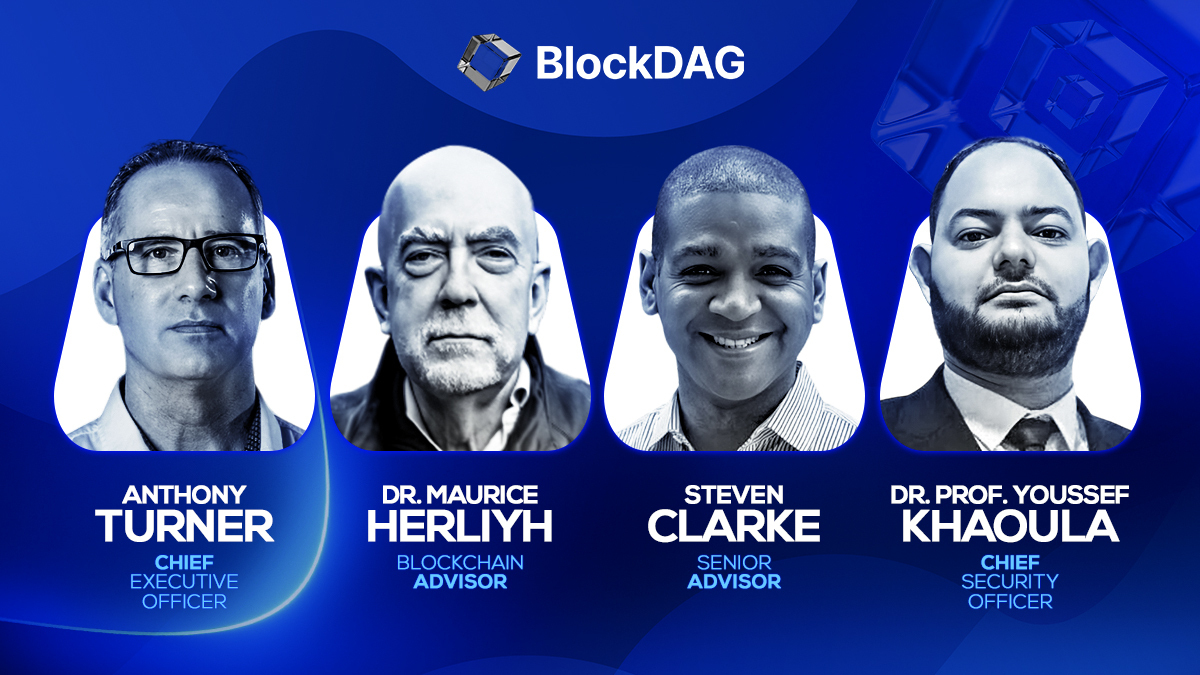
BlockDAG Network’s history is one of innovation, perseverance, and a vision to push the boundaries of blockchain technology. With Harvard alumni, tech moguls, and best-selling authors at the helm, BlockDAG is rewriting the rules of the cryptocurrency game.
CEO Antony Turner, inspired by the successes and shortcomings of Bitcoin and Ethereum, says, “BlockDAG leverages existing technology to push the boundaries of speed, security, and decentralization.” This powerhouse team has led a staggering 1,600% price increase in 20 pre-sale rounds, raising over $63.9 million. The secret? Unparalleled expertise and a bold vision for the future of blockchain.
Let’s dive into BlockDAG’s success story and find out what the future holds for this cryptocurrency.
The Origin: Why BlockDAG Was Created
In a recent interview, BlockDAG CEO Antony Turner perfectly summed up why the market needs BlockDAG’s ongoing revolution. He said:
“The creation of BlockDAG was inspired by Bitcoin and Ethereum, their successes and their shortcomings.
If you look at almost any new technology, it is very rare that the first movers remain at the forefront forever. Later incumbents have a huge advantage in entering a market where the need has been established and the technology is no longer cutting edge.
BlockDAG has done just that: our innovation is incorporating existing technology to provide a better solution, allowing us to push the boundaries of speed, security, and decentralization.”
The Present: How Far Has BlockDAG Come?
BlockDAG’s presale is setting new benchmarks in the cryptocurrency investment landscape. With a stunning 1600% price increase over 20 presale lots, it has already raised over $63.9 million in capital, having sold over 12.43 billion BDAG coins.
This impressive performance underscores the overwhelming confidence of investors in BlockDAG’s vision and leadership. The presale attracted over 20,000 individual investors, with the BlockDAG community growing exponentially by the hour.

These monumental milestones have been achieved thanks to the unparalleled skills, experience and expertise of BlockDAG’s management team:
Antony Turner – Chief Executive Officer
Antony Turner, CEO of BlockDAG, has over 20 years of experience in the Fintech, EdTech, Travel and Crypto industries. He has held senior roles at SPIRIT Blockchain Capital and co-founded Axona-Analytics and SwissOne. Antony excels in financial modeling, business management and scaling growth companies, with expertise in trading, software, IoT, blockchain and cryptocurrency.
Director of Communications
Youssef Khaoulaj, CSO of BlockDAG, is a Smart Contract Auditor, Metaverse Expert, and Red Team Hacker. He ensures system security and disaster preparedness, and advises senior management on security issues.
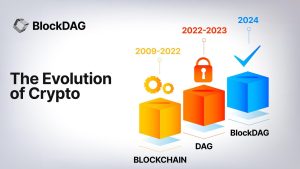
advisory Committee
Steven Clarke-Martin, a technologist and consultant, excels in enterprise technology, startups, and blockchain, with a focus on DAOs and smart contracts. Maurice Herlihy, a Harvard and MIT graduate, is an award-winning computer scientist at Brown University, with experience in distributed computing and consulting roles, most notably at Algorand.
The Future: Becoming the Cryptocurrency with the Highest Market Cap in the World
Given its impressive track record and a team of geniuses working tirelessly behind the scenes, BlockDAG is quickly approaching the $600 million pre-sale milestone. This crypto powerhouse will soon enter the top 30 cryptocurrencies by market cap.
Currently trading at $0.017 per coin, BlockDAG is expected to hit $1 million in the coming months, with the potential to hit $30 per coin by 2030. Early investors have already enjoyed a 1600% ROI by batch 21, fueling a huge amount of excitement around BlockDAG’s presale. The platform is seeing significant whale buying, and demand is so high that batch 21 is almost sold out. The upcoming batch is expected to drive prices even higher.

Invest in BlockDAG Pre-Sale Now:
Pre-sale: https://purchase.blockdag.network
Website: https://blockdag.network
Telegram: https://t.me/blockDAGnetwork
Discord: Italian: https://discord.gg/Q7BxghMVyu
No spam, no lies, just insights. You can unsubscribe at any time.
Tech
How Karak’s Latest Tech Integration Could Make Data Breaches Obsolete
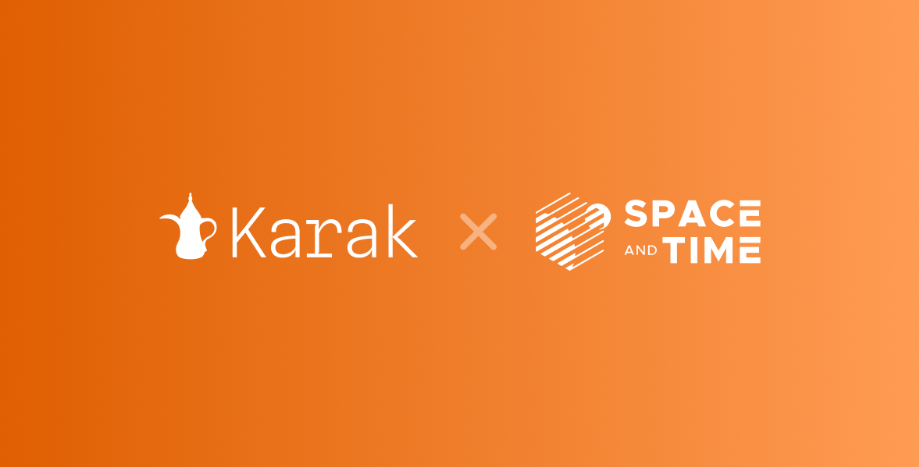
- Space and Time uses zero-knowledge proofs to ensure secure and tamper-proof data processing for smart contracts and enterprises.
- The integration facilitates faster development and deployment of Distributed Secure Services (DSS) on the Karak platform.
Karak, a platform known for its strong security capabilities, is enhancing its Distributed Secure Services (DSS) by integrating Space and Time as a zero-knowledge (ZK) coprocessor. This move is intended to strengthen trustless operations across its network, especially in slashing and rewards mechanisms.
Space and Time is a verifiable processing layer that uses zero-knowledge proofs to ensure that computations on decentralized data warehouses are secure and untampered with. This system enables smart contracts, large language models (LLMs), and enterprises to process data without integrity concerns.
The integration with Karak will enable the platform to use Proof of SQL, a new ZK-proof approach developed by Space and Time, to confirm that SQL query results are accurate and have not been tampered with.
One of the key features of this integration is the enhancement of DSS on Karak. DSS are decentralized services that use re-staked assets to secure the various operations they provide, from simple utilities to complex marketplaces. The addition of Space and Time technology enables faster development and deployment of these services, especially by simplifying slashing logic, which is critical to maintaining security and trust in decentralized networks.
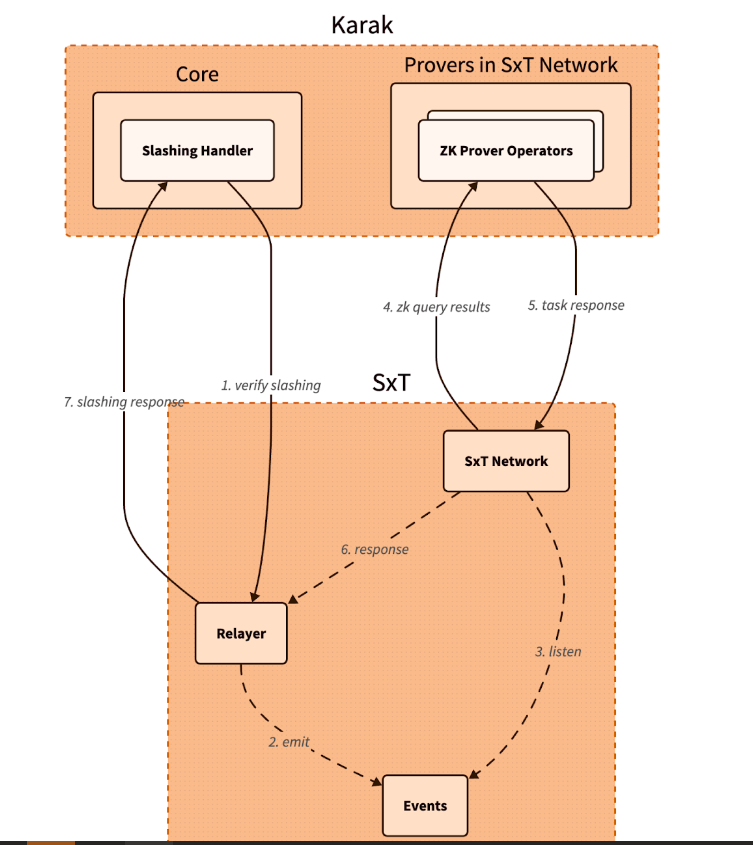
Additionally, Space and Time is developing its own DSS for blockchain data indexing. This service will allow community members to easily participate in the network by running indexing nodes. This is especially beneficial for applications that require high security and decentralization, such as decentralized data indexing.
The integration architecture follows a detailed and secure flow. When a Karak slashing contract needs to verify a SQL query, it calls the Space and Time relayer contract with the required SQL statement. This contract then emits an event with the query details, which is detected by operators in the Space and Time network.
These operators, responsible for indexing and monitoring DSS activities, validate the event and route the work to a verification operator who runs the query and generates the necessary ZK proof.
The result, along with a cryptographic commitment on the queried data, is sent to the relayer contract, which verifies and returns the data to the Karak cutter contract. This end-to-end process ensures that the data used in decision-making, such as determining penalties within the DSS, is accurate and reliable.
Karak’s mission is to provide universal security, but it also extends the capabilities of Space and Time to support multiple DSSs with their data indexing needs. As these technologies evolve, they are set to redefine the secure, decentralized computing landscape, making it more accessible and efficient for developers and enterprises alike. This integration represents a significant step towards a more secure and verifiable digital infrastructure in the blockchain space.
Website | X (Twitter) | Discord | Telegram
No spam, no lies, just insights. You can unsubscribe at any time.
Tech
Cryptocurrency Payments: Should CFOs Consider This Ferrari-Approved Trend?

Iconic Italian luxury carmaker Ferrari has announced the expansion of its cryptocurrency payment system to its European dealer network.
The move, which follows a successful launch in North America less than a year ago, raises a crucial question for CFOs across industries: Is it time to consider accepting cryptocurrency as a form of payment for your business?
Ferrari’s move isn’t an isolated one. It’s part of a broader trend of companies embracing digital assets. As of 2024, we’re seeing a growing number of companies, from tech giants to traditional retailers, accepting cryptocurrencies.
This change is determined by several factors:
- Growing mainstream adoption of cryptocurrencies
- Growing demand from tech-savvy and affluent consumers
- Potential for faster and cheaper international transactions
- Desire to project an innovative brand image
Ferrari’s approach is particularly noteworthy. They have partnered with BitPay, a leading cryptocurrency payment processor, to allow customers to purchase vehicles using Bitcoin, Ethereum, and USDC. This satisfies their tech-savvy and affluent customer base, many of whom have large digital asset holdings.
Navigating Opportunities and Challenges
Ferrari’s adoption of cryptocurrency payments illustrates several key opportunities for companies considering this move. First, it opens the door to new customer segments. By accepting cryptocurrency, Ferrari is targeting a younger, tech-savvy demographic—people who have embraced digital assets and see them as a legitimate form of value exchange. This strategy allows the company to connect with a new generation of affluent customers who may prefer to conduct high-value transactions in cryptocurrency.
Second, cryptocurrency adoption increases global reach. International payments, which can be complex and time-consuming with traditional methods, become significantly easier with cryptocurrency transactions. This can be especially beneficial for businesses that operate in multiple countries or deal with international customers, as it potentially reduces friction in cross-border transactions.
Third, accepting cryptocurrency positions a company as innovative and forward-thinking. In today’s fast-paced business environment, being seen as an early adopter of emerging technologies can significantly boost a brand’s image. Ferrari’s move sends a clear message that they are at the forefront of financial innovation, which can appeal to customers who value cutting-edge approaches.
Finally, there is the potential for cost savings. Traditional payment methods, especially for international transactions, often incur substantial fees. Cryptocurrency transactions, on the other hand, can offer lower transaction costs. For high-value purchases, such as luxury cars, these savings could be significant for both the business and the customer.
While the opportunities are enticing, accepting cryptocurrency payments also presents significant challenges that businesses must address. The most notable of these is volatility. Cryptocurrency values can fluctuate dramatically, sometimes within hours, posing potential risk to businesses that accept them as payment. Ferrari addressed this challenge by implementing a system that instantly converts cryptocurrency received into traditional fiat currencies, effectively mitigating the risk of value fluctuations.
Regulatory uncertainty is another major concern. The legal landscape surrounding cryptocurrencies is still evolving in many jurisdictions around the world. This lack of clear and consistent regulations can create compliance challenges for companies, especially those operating internationally. Companies must remain vigilant and adaptable as new laws and regulations emerge, which can be a resource-intensive process.
Implementation costs are also a significant obstacle. Integrating cryptocurrency payment systems often requires substantial investment in new technology infrastructure and extensive staff training. This can be especially challenging for small businesses or those with limited IT resources. The costs are not just financial; a significant investment of time is also required to ensure smooth implementation and operation.
Finally, security concerns loom large in the world of cryptocurrency transactions. While blockchain technology offers some security benefits, cryptocurrency transactions still require robust cybersecurity measures to protect against fraud, hacks, and other malicious activity. Businesses must invest in robust security protocols and stay up-to-date on the latest threats and protections, adding another layer of complexity and potential costs to accepting cryptocurrency payments.
Strategic Considerations for CFOs
If you’re thinking of following in Ferrari’s footsteps, here are the key factors to consider:
- Risk Assessment: Carefully evaluate potential risks to your business, including financial, regulatory, and reputational risks.
- Market Analysis: Evaluate whether your customer base is significantly interested in using cryptocurrencies for payments.
- Technology Infrastructure: Determine the costs and complexities of implementing a cryptographic payment system that integrates with existing financial processes.
- Regulatory Compliance: Ensure that cryptocurrency acceptance is in line with local regulations in all markets you operate in. Ferrari’s gradual rollout demonstrates the importance of this consideration.
- Financial Impact: Analyze how accepting cryptocurrency could impact your cash flow, accounting practices, and financial reporting.
- Partnership Evaluation: Consider partnering with established crypto payment processors to reduce risk and simplify implementation.
- Employee Training: Plan comprehensive training to ensure your team is equipped to handle cryptocurrency transactions and answer customer questions.
While Ferrari’s adoption of cryptocurrency payments is exciting, it’s important to consider this trend carefully.
A CFO’s decision to adopt cryptocurrency as a means of payment should be based on a thorough analysis of your company’s specific needs, risk tolerance, and strategic goals. Cryptocurrency payments may not be right for every business, but for some, they could provide a competitive advantage in an increasingly digital marketplace.
Remember that the landscape is rapidly evolving. Stay informed about regulatory changes, technological advancements, and changing consumer preferences. Whether you decide to accelerate your crypto engines now or wait in the pit, keeping this payment option on your radar is critical to navigating the future of business transactions.
Was this article helpful?
Yes No
Sign up to receive your daily business insights
Tech
Bitcoin Tumbles as Crypto Market Selloff Mirrors Tech Stocks’ Plunge
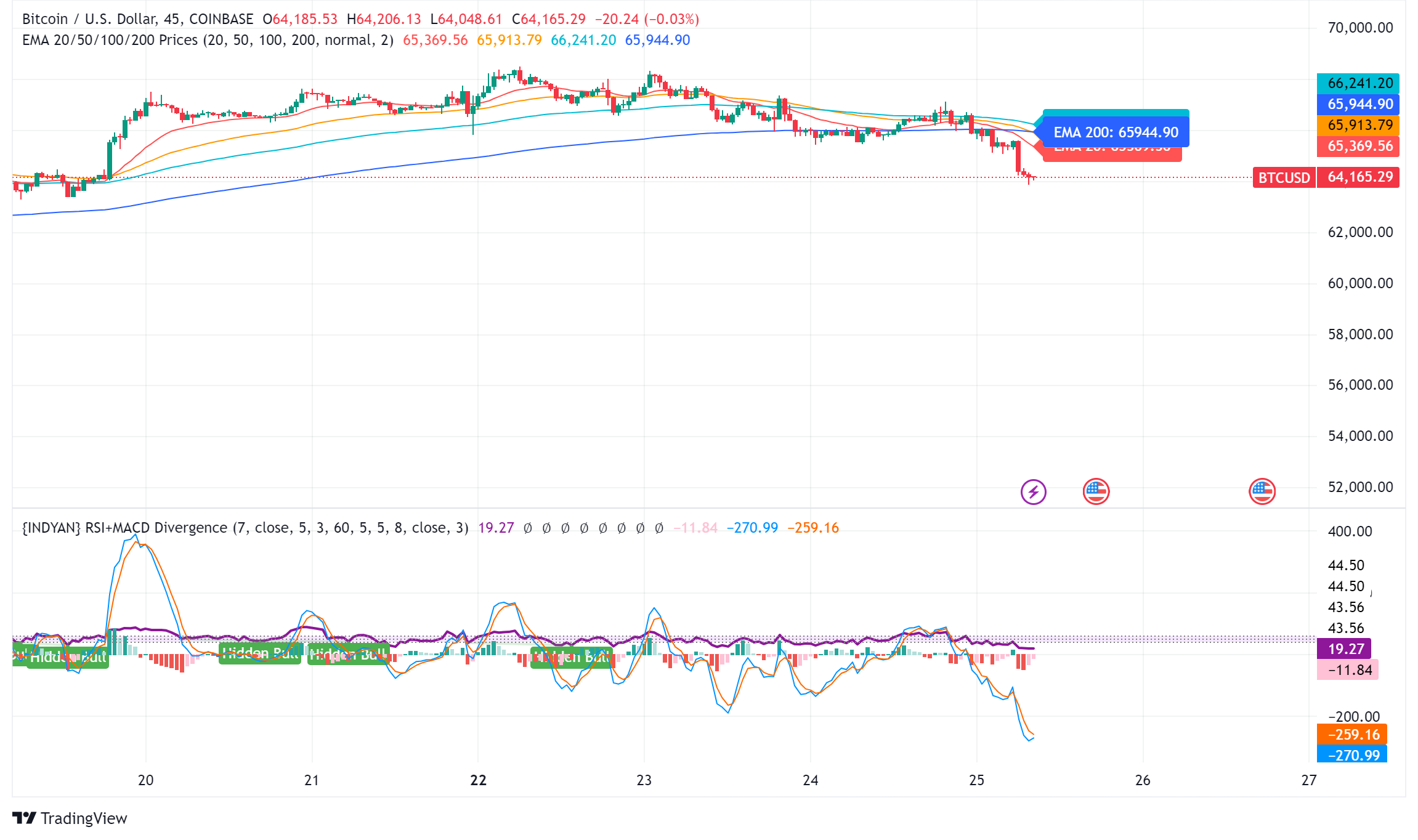
The world’s largest cryptocurrency, Bitcoin (BTC), suffered a significant price decline on Wednesday, falling below $65,000. The decline coincides with a broader market sell-off that has hit technology stocks hard.
Cryptocurrency Liquidations Hit Hard
CoinGlass data reveals a surge in long liquidations in the cryptocurrency market over the past 24 hours. These liquidations, totaling $220.7 million, represent forced selling of positions that had bet on price increases. Bitcoin itself accounted for $14.8 million in long liquidations.
Ethereum leads the decline
Ethereal (ETH), the second-largest cryptocurrency, has seen a steeper decline than Bitcoin, falling nearly 8% to trade around $3,177. This decline mirrors Bitcoin’s price action, suggesting a broader market correction.
Cryptocurrency market crash mirrors tech sector crash
The cryptocurrency market decline appears to be linked to the significant losses seen in the U.S. stock market on Wednesday. Stock market listing The index, heavily weighted toward technology stocks, posted its sharpest decline since October 2022, falling 3.65%.
Analysts cite multiple factors
Several factors may have contributed to the cryptocurrency market crash:
- Tech earnings are underwhelming: Earnings reports from tech giants like Alphabet are disappointing (Google(the parent company of), on Tuesday, triggered a sell-off in technology stocks with higher-than-expected capital expenditures that could have repercussions on the cryptocurrency market.
- Changing Political Landscape: The potential impact of the upcoming US elections and changes in Washington’s policy stance towards cryptocurrencies could influence investor sentiment.
- Ethereal ETF Hopes on the line: While bullish sentiment around a potential U.S. Ethereum ETF initially boosted the market, delays or rejections could dampen enthusiasm.
Analysts’ opinions differ
Despite the short-term losses, some analysts remain optimistic about Bitcoin’s long-term prospects. Singapore-based cryptocurrency trading firm QCP Capital believes Bitcoin could follow a similar trajectory to its post-ETF launch all-time high, with Ethereum potentially converging with its previous highs on sustained institutional interest.
Rich Dad Poor Dad Author’s Prediction
Robert Kiyosaki, author of the best-selling Rich Dad Poor Dad, predicts a potential surge in the price of Bitcoin if Donald Trump is re-elected as US president. He predicts a surge to $105,000 per coin by August 2025, fueled by a weaker dollar that is set to boost US exports.
BTC/USD Technical Outlook
Bitcoin price is currently trading below key support levels, including the $65,500 level and the 100 hourly moving average. A break below the $64,000 level could lead to further declines towards the $63,200 support zone. However, a recovery above the $65,500 level could trigger another increase in the coming sessions.
-

 News11 months ago
News11 months agoVolta Finance Limited – Director/PDMR Shareholding
-

 News11 months ago
News11 months agoModiv Industrial to release Q2 2024 financial results on August 6
-

 News11 months ago
News11 months agoApple to report third-quarter earnings as Wall Street eyes China sales
-

 News11 months ago
News11 months agoNumber of Americans filing for unemployment benefits hits highest level in a year
-

 News1 year ago
News1 year agoInventiva reports 2024 First Quarter Financial Information¹ and provides a corporate update
-

 News1 year ago
News1 year agoLeeds hospitals trust says finances are “critical” amid £110m deficit
-

 DeFi1 year ago
DeFi1 year ago🏴☠️ Pump.Fun operated by Insider Exploit
-

 Tech1 year ago
Tech1 year agoBitcoin’s Correlation With Tech Stocks Is At Its Highest Since August 2023: Bloomberg ⋆ ZyCrypto
-

 Tech1 year ago
Tech1 year agoEverything you need to know
-

 News11 months ago
News11 months agoStocks wobble as Fed delivers and Meta bounces
-

 News11 months ago
News11 months agoHutchinson House and Senate Candidates Report Finances Ahead of Election
-

 Markets1 year ago
Markets1 year ago20 Top Crypto Trading Platforms to Know












